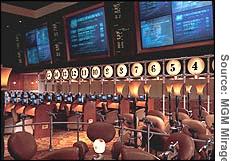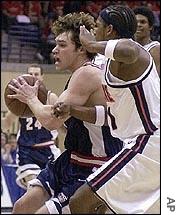
NEW YORK (CNN/Money) -
Sunday marks the start of the sporting world's most dysfunctional marriage - the combination of college basketball and gambling.
Gambling on college sports has been very good to the National Collegiate Athletic Association, indirectly adding more money to its coffers than it ever paid to Nevada casino. But the governing body is backing federal legislation to end the practice, saying it can corrupt its athletes and its sports.
Talk about March Madness.
The tip-off of the NCAA's basketball tournament is still almost a week away, but Sunday the brackets of the 65-team tournament will be set, and by Monday morning betting pools on at least the men's tourney will be underway in most workplaces around the country.
Hard-core fans and non-fans alike will take their chances at picking which teams will advance in the three-week, six-round tournament, making it by most estimates the most widespread betting event in the nation every year.
 |
|
| The NCAA wants to prevent gambling on college sports in Nevada's legal sports book like this one, even though gambling has increased interest in its tournament. |
Estimates on the amount wagered on the tournament vary widely, although all put the amount wagered on college basketball in the billions.
And casinos say much of those basketball bets comes in during the NCAA tournament, when the total amount wagered will rival the amount bet on the Super Bowl.
Nationwide gambling on the tournament has helped drive its ratings past those of even the National Basketball Association's playoffs, as the average NCAA tournament game was watched by 6.5 percent of U.S. households last year, versus the 4.9 percent who tune in to watch the pros.
"The NCAA's basketball tournaments are made for gambling," said Alan Feldman, a spokesman for Las Vegas casino operator MGM Mirage (MGG: up $0.29 to $35.59, Research, Estimates). "There is a reason virtually every newspaper in America prints the brackets. Part of the excitement of the Cinderella teams making it is that they're long shots coming in."
Such interest and ratings convinced CBS to sign a new 11-year, $6 billion contract to broadcast the tournament as well as some less high-profile events, up from the $1.75 billion, seven-year deal it completes with this tournament.
 |
|
| The success of underdog teams such as Gonzaga has helped spur both wagering and interest in the NCAA tournament. |
And still nothing troubles the NCAA more than gambling on college sports. Bill Saum, the association's director of agent, gambling and amateurism activities, says his group is worried that gambling on sports is a serious problem among college athletes. The group's surveys found 25 percent wagering on sports and 5 percent betting on their own games.
"In a perfect world, we wish there were no pools," said Saum, whose office may be one of the few in the country without such a pool come Monday. "We realize that putting a dollar in for fun is not going to make someone a compulsive gambler or impact the outcome of a game. But some of those pools on Wall Street for tens of thousands have that potential."
The serious risk for college sports is that athletes who get in over their heads to bookies will participate in point-shaving schemes in which they'll hurt their team's performance to try to give professional gamblers an edge.
And while only a fraction of the amount bet on basketball is bet in legal sports books, Saum argues that a legal sports book in Nevada gives illegal gamblers the outlet they need to complete a major point-shaving scheme. He said a 1995-96 point-shaving scandal involving Northwestern University led to $1 million in bets in Las Vegas.
"It's very difficult to lay $1 million with illegal bookies," he said.
Nevada gaming executives question that claim, saying that internal controls would stop outsiders not well-known to the casinos from laying those types of bets, and that their controls have actually helped alert college sports officials about questionable betting.
"Here we watch it minute by minute," said Feldman. "When you force it underground, anything is possible. Apparently that's a risk the NCAA is willing to take."
Still the casinos won't be out big money if the NCAA wins its push to ban wagering on amateur athletics since their sports books are a relatively thin-margin operation.
Eugene Christiansen of Christiansen Capital Advisors, an expert on gaming, said that Nevada casinos, the only ones in the country with legal sports books, make only 3 cents for every dollar wagered and probably lose money on the operation 2 months out of every 12. He said they're virtual loss leaders for the casinos.
Click here for CNNSI.com's NCAA tournament coverage
"The books themselves take up quite a bit of floor space, and on a cost basis are not the best use of that real estate," Christiansen said. "But they try to be all things to all people. There are good customers who like to bet sports."
And with the growth of gaming elsewhere, the sports books are an important distinction that Native American reservation casinos, riverboats and Atlantic City can't offer.
So don't bet on either side changing their positions any time soon, even if it would be in both of their financial interests to do so.
Click here to send mail to Chris Isidore

|

